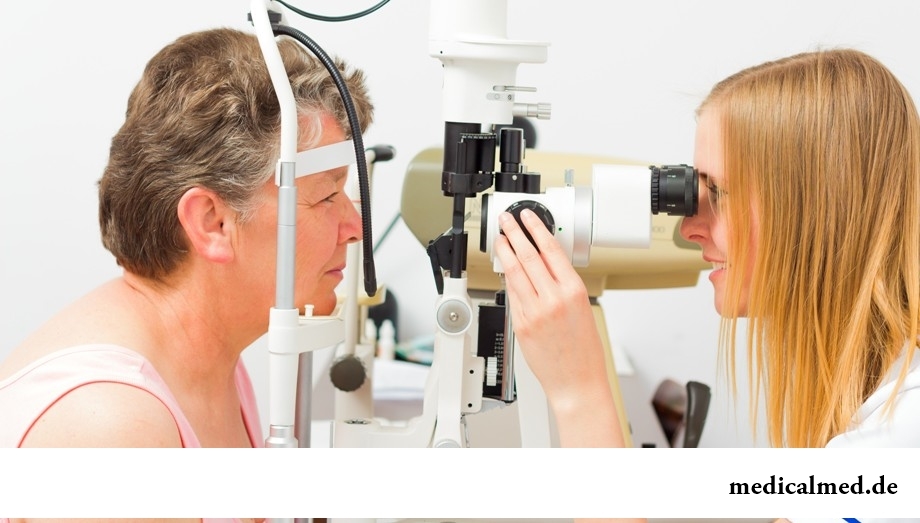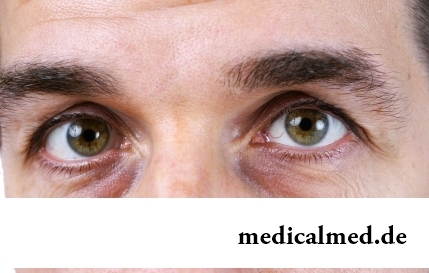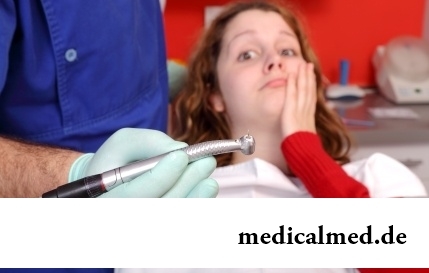





Ophthalmologist
The ophthalmologist is a medical specialist who is engaged in treatment and prevention of eye diseases, and also studying of physiology and anatomy of an eye.

Profession history
The first attempts of treatment of eye diseases were made in the 1st century B.C. The famous philosopher and the scientist Cornelius Zels allocated an iris of the eye, cameras and a ciliary body of eyes. Thanks to researches of the scientist glaucoma and a cataract were for the first time revealed, and also the technique of pressure of a cataract which was applied until the end of the 16th century is improved.
The Arab scientists got knowledge at ancient civilizations too and put them into practice. Ibn Haytam wrote the book about optics which became a basis of further creation of points and theories of sight. Ibn Xing in the treatise "Canon of Medical Medicine" developed the guide to eye diseases which was used in the European countries for 600 years.
In the 19th century the first ophthalmologic operations were performed by the surgeon J. Kritchet from England. He is one of founders of modern ophthalmology.
Now the profession the ophthalmologist covers extensive field of knowledge. The USA trains these specialists within 4 years in the bachelor's degrees, and then 4 more years in degree of the doctor of ophthalmology. Also this field of medicine is additional discipline which is studied on medical residency.
The ophthalmology covers various aspects of diagnosis, prevention and treatment of diseases of an eye, and also the diseases of a brain influencing sight.
In the USA and Europe the curriculum of the ophthalmologist includes science about sight, pharmacology, bases of a technique of diagnosis and delivery of health care, neurology, visual psychophysis and optics. Also in the course of training study aspects of functional sight, therapy, anatomy, visual perception, histology, etc.
The ophthalmologist works in close cooperation with other specialists, including with the oculist, an optometrist, the physiologist and the psychotherapist.
The ophthalmologist can send the patient to an optometrist for recovery of sight, purpose of optical devices or contact lenses.
The ophthalmologist can conduct prevention, examination and treatment, both adult patients, and children. The children's ophthalmologist checks sight, defines eye diseases. Carry to their number a cataract, a cataract, glaucoma, a ritonopatiya and others.
Also children's ophthalmologist is engaged in sight correction. There are several methods: refraktivny, medicinal and optical therapy. Only in extreme cases the children's ophthalmologist applies surgical intervention.
Specifics of medical activity of the ophthalmologist
The ophthalmologist is engaged in medical activity in policlinic and eye department of hospital, and also in specialized clinics and clinics. This specialist can work in the scientific centers, research institutes and the organizations which are engaged in studying of diseases of an eye.
The ophthalmologist carries out reception daily, conducts examinations, checks visual acuity and measures intraocular pressure, and also defines a condition of an eyeground. Reception of the ophthalmologist carries both planned, and emergency character with immediate assistance to the patient.
Patients with the progressing diseases have to address the ophthalmologist regularly.
This doctor has to accept complaints and wishes of patients. The ophthalmologist receives positive reviews at purpose of the procedures corresponding to a disease and use of an effective technique of treatment.
At serious violations of sight the doctor appoints operation, including at an injury, cataract, severe short-sightedness and glaucoma.
At heavy damage of a cornea of an eye the ophthalmologist carries out change and uses modern bio - and nanotechnologies. Now in many countries the possibility of transplantation of an artificial cornea appeared. The ophthalmologist receives good comments also after qualitatively performed operation without rejection of a cornea.
Ophthalmologist's duties
The ophthalmologist has to be the responsible, competent and professional medical specialist with good motility, high accuracy and ethics in work. This specialist has to study constantly new technologies and apply modern methods of treatment of eye diseases.
The ophthalmologist has to have high knowledge of anatomy and physiology, and also other fundamental fields of medicine.
Consultation of the ophthalmologist and types of diagnosis
Now, in connection with high development of technologies, the number of patients with eye diseases sharply increased. Register in reception of the ophthalmologist both children and teenagers, and adult patients. The ophthalmologist will receive positive reviews if uses the most effective diagnostic methods.
For detection of eye diseases the doctor uses the following diagnostic methods:
- tonometriya which represents measurement of pressure in eyes;
- oftalmoskopiya which is survey of an eyeground and eyeglobe by means of a lens;
- the vizometriya intended for visual acuity establishment;
- skiaskopiya which is used for definition of degree of an astigmatism, far-sightedness and short-sightedness;
- the iridology representing a nonconventional method of a research of changes and diseases of an eye of pathological and hereditary character.
Except people, only one living being on the planet Earth – dogs suffers from prostatitis. Here really our most loyal friends.

Cold, puffiness of a nose, itch, the watering eyes - characteristic symptoms of the allergic rhinitis resulting from hit and...
Section: Articles about health
For many women the word "fat" sounds as a sentence. In aspiration to an ideal figure they try to exclude, first of all, from the menu all dishes containing fats without having at the same time a clear idea of a role of these substances in exchange processes, and about an afterbirth...
Section: Articles about health
Zone hypostases under eyes - very widespread problem giving to people is a lot of inconvenience. Hypodermic fabric in these parts has very loose structure and almost does not contain collagenic fibers. Besides, the skin covering подглазья constantly is exposed to compression and stretching when the person blinks, blinks, etc. These features also create premises for emergence of the so-called bags which are giving to the face a tired and sickly look, and also visually adding increased...
Section: Articles about health
The problem of diagnosis was and remains to one of the most important in medicine. From that, the reason недо will be how precisely defined...
Section: Articles about health
Coffee - the tonic loved by many for the invigorating aroma and deep taste. Having the stimulating effect, coffee increases working capacity, promotes concentration of attention, fights against drowsiness and improves mood. Statistically, about 30% of inhabitants...
Section: Articles about health
The state of health of the person in many respects depends on food. The organism will well function if during food it receive only useful substances, necessary vitamins and microelements. In this case there will be no problems with digestion, with excess weight, and intellectual and physical activity will remain at the high level....
Section: Articles about health
About 10-15 years ago existence of the computer in the apartment of the Russian was considered as a rarity and office rooms were only on перв...
Section: Articles about health
What they, women? Beautiful, gentle, passionate and at the same time windy, gusty, and nervous. And what is stranger: have all these qualities of the woman at the same time. But here only the mood their time sharply changes on completely opposite: in the morning...
Section: Articles about health
Cellulitis - very widespread cosmetic shortcoming which arises approximately at 80% of women sooner or later. Emergence it is connected with change of structure of a hypodermic fatty layer. At the same time on the surface of skin at first there are roughnesses (cambers and cavities), and then small consolidations, the so-called effect of an orange-peel is shown. Changes in a condition of hypodermic cellulose are a consequence of a hormonal imbalance in an organism....
Section: Articles about health
Quite large number of people adheres to the principles of vegetarian food. But how to be if in a family of vegetarians is д...
Section: Articles about health
Statistically, can only one of ten of our compatriots brag of a decent condition of an oral cavity. Six teeth affected with caries are the share of the average Russian. For comparison, this indicator for Europeans almost six times exchanges...
Section: Articles about health
Musicotherapy – a treatment method which caused and causes a set of a controversy concerning its efficiency. However the facts are relentless: during the numerous researches curative impact of music on an organism was scientifically confirmed. Since then in a number of the countries the technique is included complex therapy of diseases of cardiovascular and respiratory system, dorsodynias and a backbone, psychosomatic disturbances and many other illnesses. The musicotherapy in a pedi is especially widely applied...
Section: Articles about health
Antibiotics - - it is possible to call the chemical compounds suppressing growth of bacteria the break in the field of medicine which allowed to save persons...
Section: Articles about health
Beauty shop – the place which is associated only with positive emotions: joy, pleasure, relaxation. However visit of salon where work with biological material of clients, not always harmlessly is conducted. Today it is known Bol...
Section: Articles about health
For the person who daily since morning gathers for work it is very important to wake up vigorous and ready by day of work. Actually, each of us experiences difficulties with this, at first sight, simple business from time to time. After night rest exert impact on a condition of an organism the weather which collected for several days fatigue, household and office problems, quality of a dream and many other factors....
Section: Articles about health
During foot walks blood moves on vessels more actively and one and all bodies are supplied with a large amount of oxygen. N...
Section: Slideshow
Neurosis is called pathology of a nervous system at which deviations in functioning of the highest nervous processes are observed. Most often - owing to yet not strengthened mentality - children are subject to neurosises. Premises to emergence of such disturbances can become нез...
Section: Articles about health
Sugar - the digestible refined product which is not of special value for an organism of the modern person. The use of sugar in food is based rather on the psychological dependence caused by desire to indulge itself with something tasty, and further and the biological, caused need of an organism for glucose as a result of big emissions of insulin in blood. Such circulation of insulin and glucose with continuous increase in portions of sugar is rather offensive and can become the reason for a narusha...
Section: Articles about health
What woman does not dream of a beautiful and thick hair? So far physicians developed difficult schemes on hair transplant, in the bet industry...
Section: Articles about health
Turnip, radish, horse-radish – once these and other products enjoyed wide popularity at our ancestors, being not only the food sating an organism but also the medicines curing of many diseases. Unfortunately, having given the use of some of them...
Section: Articles about health
Any of us is not insured from a heavy illness of the loved one. Happens and so that someone from family members becomes the bed patient, and remains in such state for a long time. It extremely suppresses both the most injured, and all its house which life considerably changes....
Section: Articles about health
Scientists always aimed to offer fundamental explanations for medical problems. Their theories formed the basis of modern methods is treated...
Section: Articles about health
Since the moment when the child becomes a school student, his sight begins to be exposed to the strengthened loadings which are supplemented with viewing of animated films and long computer games. During this period of life of the child development not completely created bodies to a zra...
Section: Articles about health
Iodine - one of thirty most important microelements in our organism. The main role of iodine consists in synthesis of thyroid hormones of a thyroid gland - the substances which are responsible for the majority of exchange processes of an organism. It is known that thyroid hormones consist of iodine more than for 65%. The lack of iodine leads to decrease in production of hormones and, as a result, development of a hypothyroidism. The long condition of deficit can become a source of problems of the cardiovascular, bone, digestive SI...
Section: Articles about health
Tea is loved and use almost everything. This drink has tonic properties, contains the tannins capable podavlit...
Section: Articles about health
Practice of hypnotic impact on consciousness of the person contains about two millennia. During this time scientists managed to learn a lot of things about a phenomenon of hypnosis and learned to facilitate a condition of the patients having heavy illnesses with its help....
Section: Articles about health
At this plant there are a lot of names: tuberiferous sunflower, Jerusalem artichoke, solar root, earth pear. Contrary to popular belief, it is not an exotic plant at all. The wild girasol grows in a midland of Russia practically everywhere: at the edges of roads, to slopes of ravines, on heathlands. Also several cultural versions different from wild plants are removed by larger and juicy root crops....
Section: Articles about health
